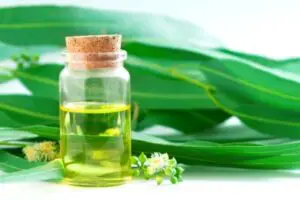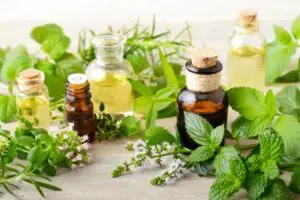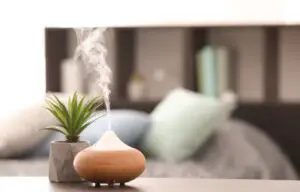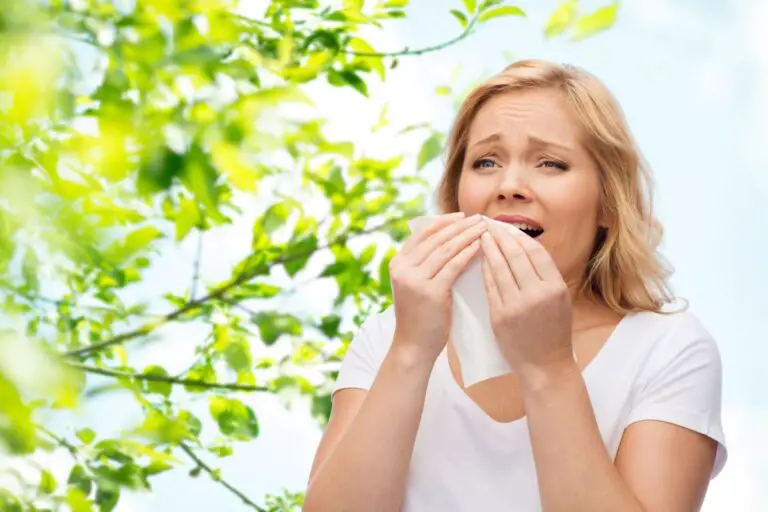Do you suffer from allergies? If so, you are not alone. Millions of people deal with allergy symptoms every year. The good news is that there are many different ways to treat allergies, including using essential oils. What is the best essential oil for allergies? The best essential oil for allergies is the one that helps to relieve your specific symptoms. For example, if you are suffering from a runny nose, watery eyes, and sneezing, you might want to try an oil with anti-inflammatory properties like eucalyptus or peppermint oil.
If you are struggling with indoor allergies, lemon oil can help reduce the symptoms of dust and pet allergies. And for outdoor allergies, lavender oil can provide relief from pollen and other airborne allergens. In addition to essential oils, other holistic remedies can help to ease allergy symptoms. These include acupuncture, probiotics, and local honey. If you have food allergies, you might also want to try eliminating certain foods from your diet or taking supplements to help reduce your symptoms. In this blog post, we will discuss the best essential oils for treating allergies and how to use them. We will also talk about some other holistic remedies for allergies that you may want to try.

What Essential Oils Help to Relieve Allergy Symptoms?
Many different essential oils can help to relieve allergy symptoms. Some of the most popular ones include:
Eucalyptus Oil
- This oil has anti-inflammatory properties and can help to reduce a runny nose, watery eyes, and sneezing.
Peppermint Oil
- Like eucalyptus oil, peppermint oil has anti-inflammatory properties. It can also help to clear sinuses and ease congestion.
Lemon Oil
- Lemon oil is great for reducing the symptoms of dust and pet allergies.
Lavender Oil
- Lavender oil can provide relief from pollen and other airborne allergens.
Common Allergy Symptoms vs. Cold Symptoms
It’s important to know the difference between common allergy symptoms and cold symptoms. This will help you to determine whether you need to see a doctor or if you can treat your symptoms at home.
Allergy symptoms include:
- Sneezing
- Runny nose
- Watery eyes
- Itchy throat
- Congestion
Cold symptoms include:
- Fever
- Body aches and pains
- Sore throat
- Coughing up mucus
Many different essential oils can help to relieve allergy symptoms. Some of the most popular ones include eucalyptus oil, peppermint oil, lemon oil, and lavender oil.
Eucalyptus oil and peppermint oil have anti-inflammatory properties and can help to reduce a runny nose, watery eyes, and sneezing. Lemon oil is great for reducing the symptoms of dust and pet allergies. Lavender oil can provide relief from pollen and other airborne allergens.
How to Use Essential Oils for Allergies
Essential oils can be used in a variety of ways to treat allergy symptoms. Some of the most popular methods include:
Diffusion
Diffuse your chosen oil or blend of oils in a diffuser to help clear congestion and ease breathing.
Topical Application
You can apply essential oils topically by diluting them with a carrier oil and rubbing them on your chest, back, or feet.
Inhalation
Place a few drops of your chosen oil on a tissue and inhale as needed to help relieve congestion.
Other Holistic Remedies for Allergies
In addition to using essential oils, other holistic remedies can help to ease allergy symptoms. These include:
Acupuncture
Acupuncture is a traditional Chinese medicine technique that involves inserting thin needles into the skin at specific points on the body. This is said to promote healing and balance in the body. Acupuncture is effective in treating a variety of conditions, including allergies.
Probiotics
Probiotics are live microorganisms that are said to have health benefits when consumed. They can be found in supplements, yogurt, and other fermented foods. Probiotics help to keep the gut healthy and have been shown to reduce allergy symptoms.
Local Honey
Eating local honey is said to help reduce allergy symptoms by exposing your body to the pollen in your area. This helps to build up immunity and lessen the severity of reactions.
Food Allergy Elimination Diet or Supplements
If you have food allergies, you might want to try eliminating certain foods from your diet or taking supplements to help reduce your symptoms.
As you can see, there are many different ways to treat allergies using essential oils and other holistic remedies. If you suffer from allergies, be sure to talk to your doctor about which treatment option is right for you.
Common Indoor Allergens That Essential Oils Can Relieve
Some of the most common indoor allergens that can be relieved by using essential oils include:
Dust Mites
Dust mites are tiny creatures that live in dust. They can cause a variety of allergy symptoms, including sneezing, watery eyes, and a runny nose.
Pet Dander
If you have allergies to pet dander, you might experience sneezing, coughing, and itchy eyes.
Mold Spores
Mold spores can cause respiratory problems and worsen asthma symptoms.
Cockroaches
Cockroaches can trigger asthma attacks and cause other respiratory problems.

Common Outdoor Allergens That Essential Oils Can Relieve
Some of the most common outdoor allergens that can be relieved by using essential oils include:
Pollen
If you have allergies to pollen, you might experience sneezing, watery eyes, and a runny nose.
Grass
If you are allergic to grass, you might experience a variety of symptoms. This may include itchy eyes, coughing, as well as difficulty breathing.
Trees
Like pollen and grass, if you are allergic to tree allergies, you might experience a variety of symptoms, including sneezing, watery eyes, and a runny nose.
Can Essential Oils Help with Food Allergies?
If you have food allergies, you might also want to try eliminating certain foods from your diet or taking supplements to help reduce your symptoms. Some essential oils that are said to be helpful for food allergies include:
- Peppermint
- Ginger
- Lemon
- Basil
- Clove
Essential oils can be a helpful addition to your allergy treatment plan. Be sure to talk to your doctor before using essential oils, especially if you have a severe allergy or are pregnant or breastfeeding.
Risks of Using Essential Oils for Allergies
As with any treatment, there are some risks associated with using essential oils for allergies. These include:
Skin Irritation
If you apply essential oils directly to your skin, you might experience mild skin irritation. If this occurs, be sure to wash the area with both soap and water.
Allergic Reaction
If you are allergic to essential oils, you might experience a severe allergic reaction. Be sure to talk to your doctor before using essential oils if you have any allergies.
Possible Side Effects
Some of the possible side effects of using essential oils for allergies include headaches, dizziness, and nausea. If you experience any of these side effects, be sure to stop using the oil and talk to your doctor.
Essential Oil Safety Around Children and Pets
If you have children or pets, be sure to keep essential oils out of their reach. Essential oils can be harmful if ingested by either children or animals. Some of the dangers of essential oils for children include:
Aspiration Pneumonitis
If a child ingests essential oils, they might aspirate the oil into their lungs. Unfortunately, this can cause a severe lung infection.
Seizures
Certain essential oils, such as camphor and sage, can cause seizures in children.
Pets can also be harmed by essential oils. If you have pets, be sure to talk to your veterinarian before using any essential oils around them. Some of the dangers of essential oils for pets include:
- Kidney Damage
- Liver Damage
- Respiratory Problems
- Skin Irritation
There are some risks associated with using essential oils for allergies. Be sure to talk to your doctor before using any essential oils, and always follow the directions on the label.
Holistic Allergy Treatment vs. Conventional Allergy Treatment
There are many different ways to treat allergies, both conventional and holistic. Conventional allergy treatments include over-the-counter and prescription medications, such as antihistamines, decongestants, and corticosteroids.
These medications can be effective in treating allergy symptoms, but they can also have side effects, such as drowsiness, dry mouth, and dizziness.
Holistic allergy treatments are said to be more natural as well as have fewer side effects. As you can see, there are many different options available to treat allergies. Be sure to talk to your doctor about which treatment is right for you.
Other Uses for Essential Oils

Essential oils have many uses outside of treating allergies. Some other uses for essential oils include:
Aromatherapy
Diffusing essential oils into the air is said to help improve mood, reduce stress, and also to promote relaxation.
Massage
Adding a few drops of essential oil to your massage oil or lotion can help both improve circulation and relieve muscle pain.
Insect Repellent
Certain essential oils, such as citronella, eucalyptus, and lavender, can help repel insects.
As you can see, there are many different uses for essential oils. Be sure to talk to your doctor before using any essential oils, especially if you have a medical condition.
Does Essential Oil Purity Matter?
When purchasing essential oils, be sure to look for oils that are pure, organic, and unrefined. These oils will be the most potent as well as have the most health benefits. Avoid essential oils that are diluted with either other oils or chemicals.
Try Using Essential Oils to Find Allergy Relief
Essential oils can be a helpful addition to your allergy treatment plan, but it’s important to remember that they are not a cure-all. Be sure to talk to your doctor before using essential oils, and always follow the directions on the label. If you have any concerns about using essential oils, be sure to talk to your doctor.


